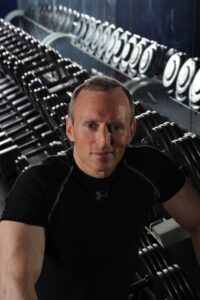
Show 1342: Balancing Your Movement Diet for Good Health
Description
Physical activity is a key pillar of good health. Fewer than a fourth of American adults move their bodies enough to keep them healthy. The rest of us may spend too much time sitting in front of a computer or television screen. We recognize we need more exercise. But just as we wouldn’t try to meet all our energy needs by eating only pizza, we need to participate in a variety of physical activities. How are you balancing your movement diet?
Balancing Your Movement Diet with Strength Training:
If you, like many people, wear a device that counts your steps, what goals do you set for yourself? Muscles that don’t get used get lazy and atrophy. Have you considered balancing your movement diet with strength training or resistance exercises? This is the way to create stronger muscles, and along with that you make your bones stronger as well. When we think of cardiovascular health, aerobic activity comes to mind first. However, strength training also benefits the heart and may boost cognitive capacity as well.
Do you imagine you are too old (or too busy) for strength training? Studies have shown that even elderly people can benefit greatly from resistance exercises. They may need to start with smaller weights or more flexible resistance bands, but they can increase their strength.
You don’t have to join a gym or spend a fortune on equipment. Body weight exercises like squats or push-ups are great. There’s also no need to fret about the perfect time of day to exercise. Your body will adapt to your movement diet at whatever time of day suits your schedule best.
Varying Hinges and Alignment:
Have you ever heard of tennis elbow? It is by no means limited to tennis players. It is an injury that results from repeating the same motion (whether hitting a tennis ball or practicing a karate punch) over and over.
Both our expert guests stress the importance of good form (including good alignment) as you move throughout the day. Checking in with an expert such as a personal trainer can help you master the proper form and alignment and reduce your chance of injury.
Are you balancing your movement diet so that you vary the hinges (like elbows, hips or knees) that you are using? If you spend a lot of time in a position with your head bent forward, you might want to correct for that awkward alignment by stretching your neck back and up every so often. You could imagine yourself as a computer athlete and make sure that you engage in cross-training for desk jockeys.
This Week's Guests:
Brad Schoenfeld, Strength Training:
Brad Schoenfeld, PhD, is a professor of exercise science at Lehman College in the Bronx, New York, where he serves as the graduate director of the Human Performance and Fitness program. Dr. Schoenfeld has published more than 250 peer-reviewed scientific papers on various exercise- and sports nutrition-related topics, and authored the seminal textbook, Science and Development of Muscle Hypertrophy.
Dr. Schoenfeld’s research primarily focuses on muscle adaptations to strength training and muscle hypertrophy. He has published more than 300 articles about exercise science and sports nutrition, making him a leader in these fields. Dr. Schoenfeld began his career as a competitive bodybuilder and personal trainer, giving him a unique practical lens through which he communicates his academic expertise.
[caption id="attachment_126364" align="alignnone" width="200"] Title:The MAX Muscle Plan
Title:The MAX Muscle PlanDE:Carla Zych[/caption]
Katy Bowman, Movement Diet:
Katy Bowman is a biomechanist and bestselling author of 9 books, including Move Your DNA, Grow Wild, and her latest book, Rethink Your Position. Named one of Maria Shriver's "Architects of Change," Bowman is changing the way we move and think about our need for movement. Her movement education company is NutritiousMovement.com and she is the host of the Move Your DNA podcast. The photo is by Mark Kuroda.

Confidence
Thank you for sharing your thoughts about one of our products! Please focus on the product performance and quality. Please read our Privacy Policy and Terms of Use for more information about the review process.
